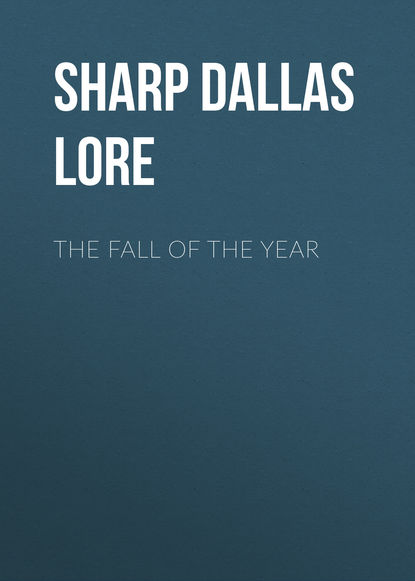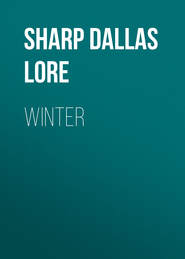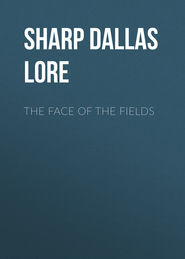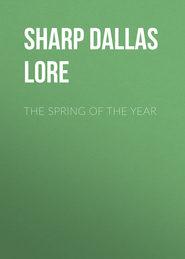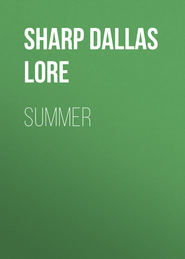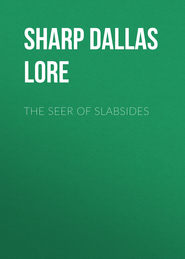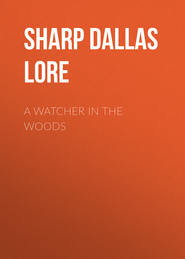По всем вопросам обращайтесь на: info@litportal.ru
(©) 2003-2024.
✖
The Fall of the Year
Настройки чтения
Размер шрифта
Высота строк
Поля
FOR THE PUPIL
Page 46
end of the outdoors: The fall plowing, even the digging of the ditches – all the work in the soil is about over by Thanksgiving when the ground begins to freeze.
Page 47
crib-house: Where the writer lived as a boy the corn was husked and left in the ear and stored in long, narrow houses built of beveled slats spaced about half an inch apart to allow the wind free play, but like the thin slats of a shutter so arranged that the rain ran down and, except in a driving wind, did not wet the grain.
“spring-house”: Spring-houses took the place of modern ice-chests, being little cupboard-like houses well ventilated and screened, built near the farmhouse and usually over a spring of water that kept the milk and other contents cool.
battened: Is this a “land” term or a “sea” term? What does it mean? Look it up and report.
the swallows: These were the barn swallows – the beautiful swallows with the long, finely-forked tail. You will always know them on the wing by the brown breast and fine forked tail.
worm-fence: A worm-fence is built of rails laid one on top of the other, running zigzag, each corner held together by two upright stakes, set in the ground and crossed just above the next-to-the-top rail. The top rail is laid in the crotch of the two stakes.
turn-o’-lane: name of a very excellent old-fashioned apple that got its name from the fact that the original tree of the kind grew at a turn of the lane – the writer does not know whose lane.
Page 48
double-hived: It is customary to cover beehives with newspapers, then slip an outside box down over papers and all to keep the swarm from the cutting cold winds of winter. Bees are frequently brought into the cellar for the winter in northern latitudes.
put on an extra coat, and turned their collars up about their ears: What does the writer mean?
changed their roost from the ridge-pole: Turkeys roost high; but the ridge-pole of the crib-house used to be too cold in the dead of winter, so they would change to the more protected apple-tree, still roosting high, however.
pearmain: name of a “summer” apple in New Jersey; of a winter apple in this section of Massachusetts.
garden of box: the box bush.
bleeding-hearts: an old-fashioned flower; a low shrub with pendent blossoms shaped like a heart.
creeper: the Virginia creeper, or woodbine.
Page 49
“template” stove: from template or templet, a strip of sheet iron used in boiler-making. A simple long stove made of a single piece of sheet iron, bent like an inverted U, and riveted to a cast iron bottom. It had a single door in the front; and burnt pieces of wood about two feet long. Often called “tenplate” stove.
Page 50
seven of us alone: seven brothers and sisters in the writer’s family.
flats: Describe the outside appearance of a city “flat,” and also the inside if you have ever been in a flat. Is it like a farmhouse?
kitchenette: What kind of a kitchen is a kitchenette?
neither a farm nor a city home: By which the writer means a farm in the ordinary sense of land cultivated for a living. His is a home only, with several acres around it, largely in woods and grass.
Page 51
“Bucksy”: the invented name of a little Indian hero about whom the writer tells stories to his little boys.
CHAPTER VII
TO THE TEACHER
Suggestions as to the practical uses to which this chapter can be put may be gathered from the notes to chapter IV and chapter XII, each of which is similar to this one.
CHAPTER VIII
TO THE TEACHER
This chapter and the next (chapter IX) should be taken together as a single study of the provision of nature against the severity of winter’s cold, chapter VIII being a detailed account of one creature’s preparations, while chapter IX follows, showing how the foresight and care obtain even among the plants and trees. The two chapters together should give the pupils a glad thought for winter, should utterly change their conventional language and feeling for it as a time of death. And instead of lamenting the season as a necessary evil, you must show them that it is to be welcomed as a period of sleep for nature from which she will waken in all the freshness of a springtime such as is nowhere to be had outside of the temperate zone. “It is not always May,” wails the poet; but ask them: Who wants it always May? We want the variety, the contrasts of our four seasons, and as to winter, let the North Wind blow at will, redden our cheeks, quicken our step, put purpose into our wills and – it won’t starve us; for we, too, like the muskrat, are provided for.
FOR THE PUPIL
If there is a muskrat house or village of houses in your neighborhood, report to the class, or better, take teacher and class, as soon as freezing weather comes, to see it. Go out yourselves and try to see the muskrats plastering their walls on one of the bright October nights.
Page 63
muskrats combine: The author has frequently found as many as six rats in a single house; but whether all of these helped in the building or not, he is unable to say.
winter house: If the house is undisturbed (as when situated out in a stumpy pond) it will stand for years, the rats dwelling in it the year around.
Page 64
pick and shovel: What is meant by a fox’s “pick and shovel”?
Lupton’s Pond: the name of a little wood-walled pond that the author haunted as a boy.
“The best-laid schemes o’ mice and men
Gang aft agley.”
Learn this poem (“To A Mouse”) by heart. Burns is the author.
Page 65
very much alike: Name some other respects in which animals and men are alike in their lives. What famous line in the poem just quoted is it that makes men and mice very closely related?
bottom of the house: Down in the very foundation walls of the muskrat’s house are two runways or “doors” that open under water and so far under that they rarely if ever freeze. See picture of such a house with its door in the author’s “Wild Life Near Home,” page 174.
Page 66
tepee: What is a tepee?
juicy and pink and tender: The muskrats eat grass stems and roots, so that under the water near the lodge you will often find in winter little stacks of these tender pink stems and roots ready for eating – much as the beaver stores up sticks of tender bark under the water near his lodge for food when the ice forms overhead.
Winter is coming: Are you glad or sorry? Are you ready?
Page 46
end of the outdoors: The fall plowing, even the digging of the ditches – all the work in the soil is about over by Thanksgiving when the ground begins to freeze.
Page 47
crib-house: Where the writer lived as a boy the corn was husked and left in the ear and stored in long, narrow houses built of beveled slats spaced about half an inch apart to allow the wind free play, but like the thin slats of a shutter so arranged that the rain ran down and, except in a driving wind, did not wet the grain.
“spring-house”: Spring-houses took the place of modern ice-chests, being little cupboard-like houses well ventilated and screened, built near the farmhouse and usually over a spring of water that kept the milk and other contents cool.
battened: Is this a “land” term or a “sea” term? What does it mean? Look it up and report.
the swallows: These were the barn swallows – the beautiful swallows with the long, finely-forked tail. You will always know them on the wing by the brown breast and fine forked tail.
worm-fence: A worm-fence is built of rails laid one on top of the other, running zigzag, each corner held together by two upright stakes, set in the ground and crossed just above the next-to-the-top rail. The top rail is laid in the crotch of the two stakes.
turn-o’-lane: name of a very excellent old-fashioned apple that got its name from the fact that the original tree of the kind grew at a turn of the lane – the writer does not know whose lane.
Page 48
double-hived: It is customary to cover beehives with newspapers, then slip an outside box down over papers and all to keep the swarm from the cutting cold winds of winter. Bees are frequently brought into the cellar for the winter in northern latitudes.
put on an extra coat, and turned their collars up about their ears: What does the writer mean?
changed their roost from the ridge-pole: Turkeys roost high; but the ridge-pole of the crib-house used to be too cold in the dead of winter, so they would change to the more protected apple-tree, still roosting high, however.
pearmain: name of a “summer” apple in New Jersey; of a winter apple in this section of Massachusetts.
garden of box: the box bush.
bleeding-hearts: an old-fashioned flower; a low shrub with pendent blossoms shaped like a heart.
creeper: the Virginia creeper, or woodbine.
Page 49
“template” stove: from template or templet, a strip of sheet iron used in boiler-making. A simple long stove made of a single piece of sheet iron, bent like an inverted U, and riveted to a cast iron bottom. It had a single door in the front; and burnt pieces of wood about two feet long. Often called “tenplate” stove.
Page 50
seven of us alone: seven brothers and sisters in the writer’s family.
flats: Describe the outside appearance of a city “flat,” and also the inside if you have ever been in a flat. Is it like a farmhouse?
kitchenette: What kind of a kitchen is a kitchenette?
neither a farm nor a city home: By which the writer means a farm in the ordinary sense of land cultivated for a living. His is a home only, with several acres around it, largely in woods and grass.
Page 51
“Bucksy”: the invented name of a little Indian hero about whom the writer tells stories to his little boys.
CHAPTER VII
TO THE TEACHER
Suggestions as to the practical uses to which this chapter can be put may be gathered from the notes to chapter IV and chapter XII, each of which is similar to this one.
CHAPTER VIII
TO THE TEACHER
This chapter and the next (chapter IX) should be taken together as a single study of the provision of nature against the severity of winter’s cold, chapter VIII being a detailed account of one creature’s preparations, while chapter IX follows, showing how the foresight and care obtain even among the plants and trees. The two chapters together should give the pupils a glad thought for winter, should utterly change their conventional language and feeling for it as a time of death. And instead of lamenting the season as a necessary evil, you must show them that it is to be welcomed as a period of sleep for nature from which she will waken in all the freshness of a springtime such as is nowhere to be had outside of the temperate zone. “It is not always May,” wails the poet; but ask them: Who wants it always May? We want the variety, the contrasts of our four seasons, and as to winter, let the North Wind blow at will, redden our cheeks, quicken our step, put purpose into our wills and – it won’t starve us; for we, too, like the muskrat, are provided for.
FOR THE PUPIL
If there is a muskrat house or village of houses in your neighborhood, report to the class, or better, take teacher and class, as soon as freezing weather comes, to see it. Go out yourselves and try to see the muskrats plastering their walls on one of the bright October nights.
Page 63
muskrats combine: The author has frequently found as many as six rats in a single house; but whether all of these helped in the building or not, he is unable to say.
winter house: If the house is undisturbed (as when situated out in a stumpy pond) it will stand for years, the rats dwelling in it the year around.
Page 64
pick and shovel: What is meant by a fox’s “pick and shovel”?
Lupton’s Pond: the name of a little wood-walled pond that the author haunted as a boy.
“The best-laid schemes o’ mice and men
Gang aft agley.”
Learn this poem (“To A Mouse”) by heart. Burns is the author.
Page 65
very much alike: Name some other respects in which animals and men are alike in their lives. What famous line in the poem just quoted is it that makes men and mice very closely related?
bottom of the house: Down in the very foundation walls of the muskrat’s house are two runways or “doors” that open under water and so far under that they rarely if ever freeze. See picture of such a house with its door in the author’s “Wild Life Near Home,” page 174.
Page 66
tepee: What is a tepee?
juicy and pink and tender: The muskrats eat grass stems and roots, so that under the water near the lodge you will often find in winter little stacks of these tender pink stems and roots ready for eating – much as the beaver stores up sticks of tender bark under the water near his lodge for food when the ice forms overhead.
Winter is coming: Are you glad or sorry? Are you ready?





